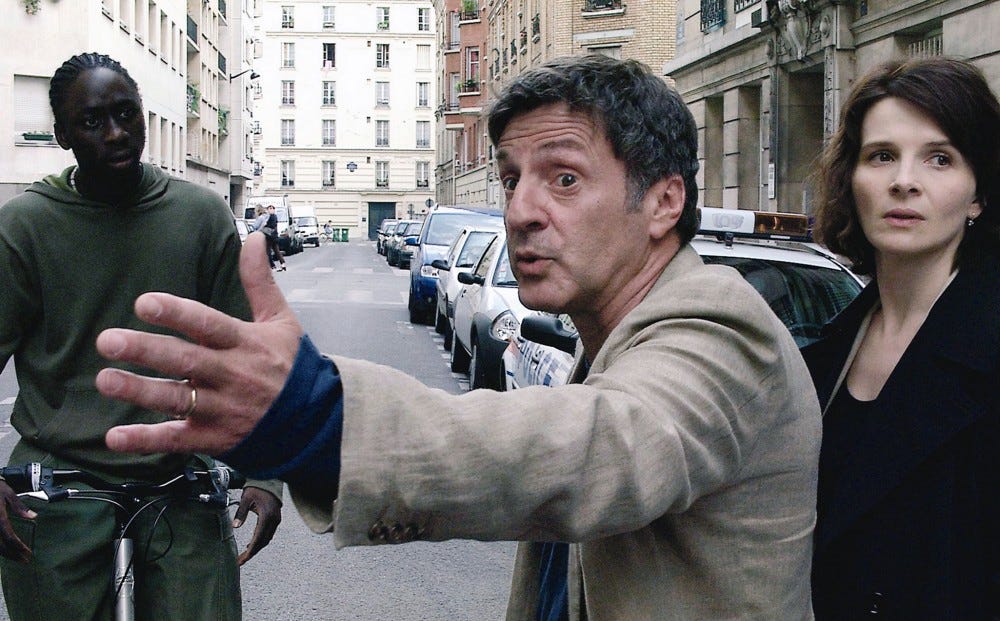2005 Revisited: CACHÉ (HIDDEN)
[As will be the case for most of the material I’ll be writing about 20-year-old movies, there will be spoilers herein.]
If Tony Takitani was the 2005 film I was most surprised to see on my top 10 list for that year, Michael Haneke’s Caché (Hidden) was the one I was most surprised to see not on that list. That’s not because it’s a film I’ve revisited many times in the subsequent two decades; I’m pretty sure I’d only ever seen it the one time before watching it this week. Yet it’s a movie that I’ve thought about periodically over the years, reflecting on individual moments and filmmaking decisions that stuck with me. Maybe the only reason I didn’t include it 20 years ago was the timing of its local release (it opened in Salt Lake City in February 2006, and I wasn’t consistently getting year-end awards screeners yet at that point). Maybe this was a sure thing for one of the revised 2005 top 10 slots.
Perhaps the most shocking thing I discovered when re-watching Caché is how much it feels like a movie that could have been released last week. That might seem counter-intuitive, since the defining technology involved in the premise—an upper-middle-class French couple, Georges (Daniel Auteuil) and Anne (Juliette Binoche), who start receiving ominous evidence that they’re being surveilled—is analog videotape, and one plot point hinges on the reality that adolescents of the era didn’t generally carry cell phones yet. But it’s the morality play at the center of it that feels so contemporary, wrestling with the legacy of colonialism and with privileged people who don’t see why they should be called to account for things that happened “so long ago.” While it’s fashioned as a psychological thriller, it’s really a character study about chickens—headless ones, as it were—coming home to roost.
That means it’s important to dismiss from the outset the idea that there is a genuine mystery to be solved in the question of who is sending the tapes to Georges and Anne. It’s ultimately only one of two people—either Majid (Maurice Bénichou), the Algerian man with whom Georges has a fraught family history, or Majid’s unnamed son (Walid Afkir), since one of the tapes was recorded inside of Majid’s apartment. And while Haneke chooses not to make the answer explicitly clear, I’m not convinced all that much changes thematically depending on which one of them it was. Once it becomes evident that this unsettling episode is in some way connected to the actions Georges took as a child in making sure his potential foster-brother Majid would just go away, the crux of the story is what Georges does with that information.
And what Georges does, in the fine tradition of privileged White dudes, is not to reckon with any sense of guilt or shame, but to get indignant. Auteuil’s performance is terrific, with Haneke giving Georges that sense of absolute righteousness that nothing could be more unfair than someone forcing him to be uncomfortable about his past behvaior. Indeed, much of Caché becomes a character study of Georges steadfastly refusing to take responsibility for anything. That’s most notable in his interactions with Anne, perhaps most obviously in the arguments they have over his response to the videotapes. Yet there’s also a wonderfully telling moment in the aftermath of Georges witnessing Majid’s suicide, when he returns home to Anne hosting their friends Pierre and Mathilde. Georges asks Anne to make up an excuse for why Pierre and Mathilde need to leave, and he suggests saying that either Anne or their son Pierrot might not be feeling well—anything, that is to say, that wouldn’t make him the bad guy.
There is obviously a very specifically French historical framework to the tensions between Georges and Majid, in terms of the October 1961 massacre of Algerians by Paris police—but that doesn’t mean that Caché lacks a resonance beyond that specificity. It’s a narrative about entitlement—like George walking between cars into traffic and immediately insisting that the Black bicyclist who almost hit him is the one to blame—and the prevalent notion that we all just need to put dark chapters behind us and move on, because being called a racist is somehow worse than actually being a racist. The enigmatic, unsettling final shot of Caché, which includes evidence that Majid’s son is making contact with George’s son, suggests that it’s not so easy to escape from the things you’ve done, and that they can ripple through generations. As squirm-inducing as Haneke’s film might be at times, there’s something almost reassuring about its sense of justice ultimately being inescapable; it’s practically “Well Well, If It Isn’t the Consequences of My Actions”: The Motion Picture.

